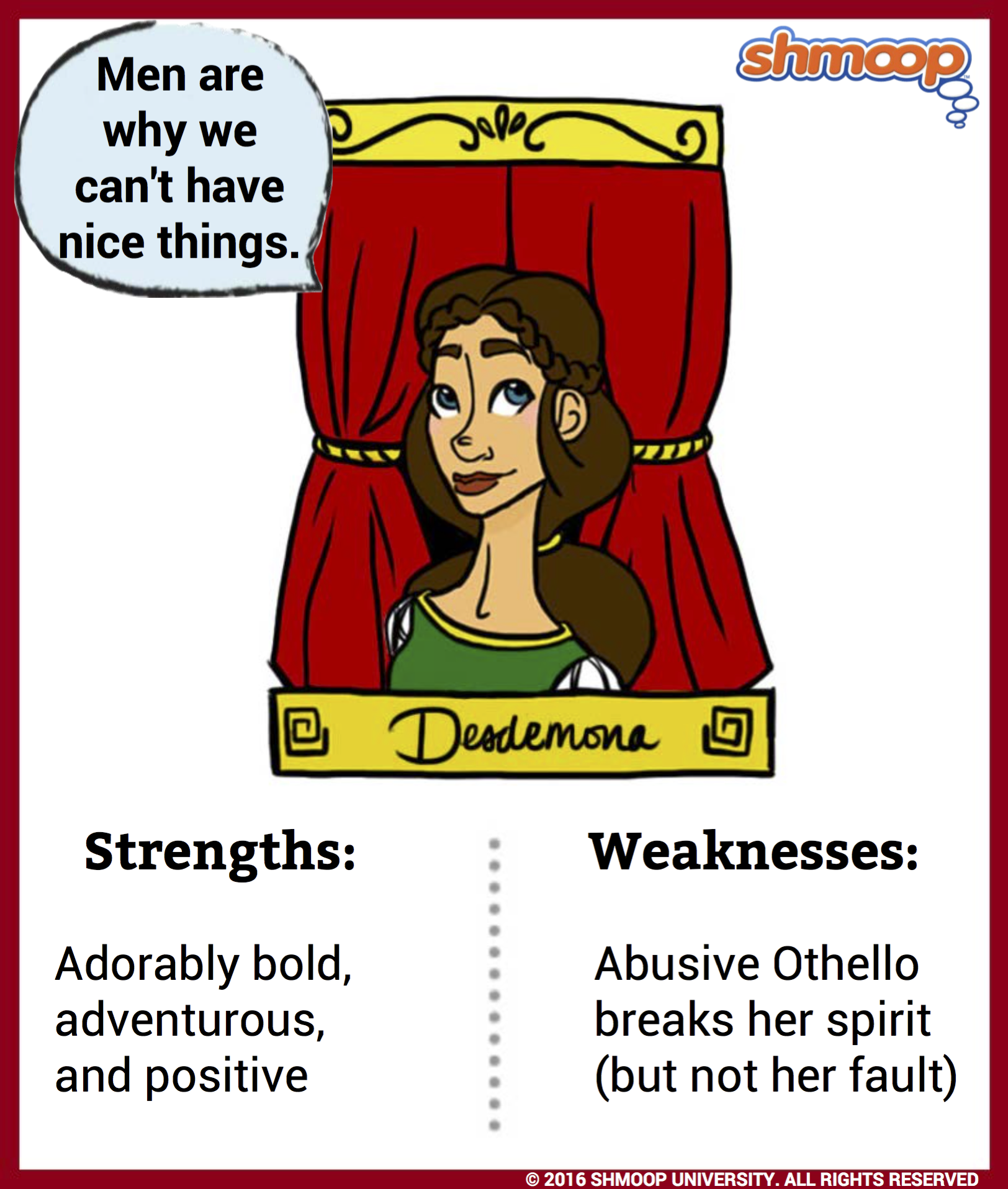Character Analysis

(Click the character infographic to download.)
Desdemona is a beautiful, young, white, Venetian debutante. And she's a total Daddy's girl... until she falls head over heels in love with Othello. She refuses to marry any of the rich, handsome Venetian men that everyone expects her to marry. Instead, she elopes (gasp!) with Othello—an older black man, an outsider to Venetian society (gasp!).
Turns out, this is a pretty gutsy move—Desdemona not only defies her father's expectations (that she marry a white man of his choosing); she also thumbs her nose at a society that largely disapproves of interracial marriages. In this way, Desdemona's relationship with Othello speaks to the play's concerns with 16th century attitudes about sex, gender, and race... which we discuss in more detail in our "Themes" section.
From "Fair Warrior" to Victim of Abuse
Like Othello, Desdemona undergoes a dramatic transformation over the course of the play. At the play's beginning, Desdemona's an adventurous spirit—when her new husband is called away for military duty in Cyprus, she begs to go with him and can't stand the thought of remaining at home where there isn't any action.
This isn't so surprising, given that Desdemona seems to be drawn to Othello's exciting past. We learn that Othello wooed Desdemona by telling stories of action, adventure, and danger, and that Desdemona consumed these tales with a "greedy ear:"
Her father loved me, oft invited me,
Still questioned me the story of my life
From year to year—the battles, sieges, fortunes,
That I have passed.
I ran it through, even from my boyish days
To th' very moment that he bade me tell it,
Wherein I spake of most disastrous chances:
Of moving accidents by flood and field
Of hair-breadth 'scapes i' th' imminent deadly
breach,
Of being taken by the insolent foe
And sold to slavery, of my redemption thence,
And portance in my traveler's history,
Wherein of antres vast and deserts idle,
Rough quarries, rocks and hills whose heads
touch heaven,
It was my hint to speak—such was the process—
And of the Cannibals that each other eat,
The Anthropophagi, and men whose heads
Do grow beneath their shoulders. These things to
hear
Would Desdemona seriously incline. (1.3.149-170)
We also know that Desdemona has said she wishes the heavens had made her a man like Othello, which could mean that she wanted to marry a man like Othello... or that wishes she were a man like Othello, instead of a woman.
Desdemona's also pretty frank about her sexual desire for her husband, which is part of the reason she wants to go with him to Cyprus:
DESDEMONA
That I did love the Moor to live with him
My downright violence and storm of fortunes
May trumpet to the world. My heart's subdued
Even to the very quality of my lord.
I saw Othello's visage in his mind,
And to his honor and his valiant parts
Did I my soul and fortunes consecrate.
So that, dear lords, if I be left behind,
A moth of peace, and he go to the war,
The rites for which I love him are bereft me
And I a heavy interim shall support
By his dear absence. Let me go with him. (1.3.283-294)
Desdemona is totally drooling over Othello's "valiant parts:" Othello's a hottie with a body.
But at times, Desdemona also seems a bit naïve, especially when it comes to marital relationships—at one point, she asks an incredulous Emilia if it's possible that a woman would ever cheat on her husband.
This gives us a hint as to why Desdemona doesn't seem to have a clue that Othello suspects her of infidelity—for Desdemona, the idea is simply unthinkable. Despite her loyalty to her husband, Othello physically and verbally abuses Desdemona, slapping her and calling her a whore in public.
By the play's end, Desdemona is so beaten down that she's pretty passive when Othello strangles her and when, with her dying breath, she blames herself for Othello's physical and emotional abuse.
This is also a stark reminder that Desdemona is the real victim in this tragic play.
Do Othello and Desdemona Ever Consummate Their Marriage?
Shakespeare scholar Harold Bloom thinks that Desdemona's virginity is the big driving question of the play. Bloom argues that Othello and Desdemona never had sex—that Desdemona actually dies a virgin.
He points out that every time the newlyweds come close, something interrupts them—an order to come see the Duke, a war, or Cassio's drunken brawl. When Desdemona and Othello first arrive in Cyprus, it's clear they haven't had sex yet. After all, Othello says it explicitly.
What happens next—whether Cassio's fight really prevents any sex at all that night—is less clear. But Bloom argues that what makes Othello's jealousy so torturous is that the only way he can figure out if Desdemona is actually cheating with him or not is to have sex with her. If she's still a virgin, she's been faithful. But, Bloom suggests, Othello just can't take the pressure of sleeping with his wife and the possibility of realizing in the act that she's not a virgin, which would prove that she must have been sleeping around.
Other literary scholars argue that Othello and Desdemona do eventually consummate their marriage in the play—just before their lovemaking is interrupted by Cassio's drunken brawl. This is the reason Othello goes nuts: according to this theory, Othello believes that his black skin color makes him contaminated and contaminating.
When he has sex with Desdemona, Othello thinks he's polluted her pure (white) body, and he just can't stand it. As we know, several characters (like Brabantio and Iago) claim that black men like Othello contaminate white women they have sexual contact with. If it's true that Othello believes he's polluted Desdemona and turned her into a filthy "whore," then it would mean that Othello has internalized the racism that he encounters in the play.
Desdemona's Timeline